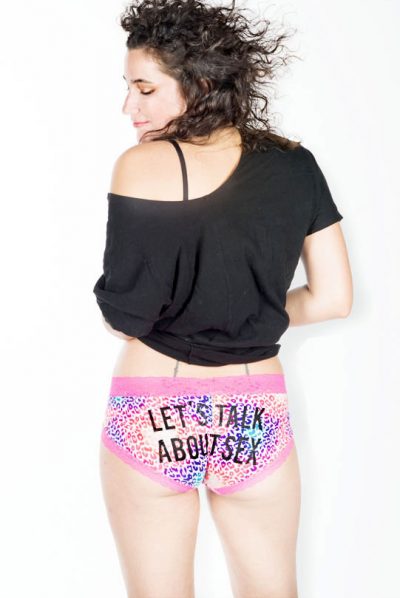
When I was in seventh grade, my friends had it all: From “Juicy” across the butt to “So Low” just above the buttcrack, their clothing was what I yearned to wear. My mom had a strict no-words-on-the-butt policy and was viciously opposed to any and all suggestive messaging. The few times I was able to cajole her to walk into Abercrombie with me usually ended just as quickly, with her storming out in a huff. She didn’t understand why I would want to hear a T-shirt that said “Show The Twins” on it. I didn’t understand what “Show The Twins” meant and just thought that the funny little picture of the busty barmaid was cool. My mini-rebellions usually consisted of sneaking off to Victoria’s Secret and buying wordy underwear that I could hide underneath my clothes and wear undetected.
I wasn’t trying to be suggestive; I hadn’t even gotten my period yet. For all I knew, “Take it off” was a pre-laundry instruction, while “I Get Around” was merely referencing all the traveling I had to do for basketball games. Some things, as my mother used to say, you just understand with age.
Now, I understand. (Seriously, what was Juicy thinking?) And for that, I genuinely appreciate (and am obsessed with) the media ruse pulled on Victoria’s Secret last week by FORCE, a feminist activist group. Targeting the inappropriate messaging that inundates Victoria’s Secret’s PINK, an adolescent undie-line, FORCE launched a faux-VS website that exhibited a new line of VS underwear. The catch was that the underwear’s slogans were body-and-sex positive rather than coy and demeaning. The website, PINK loves CONSENT, describes the new underwear line as a revolution, rather than just a style. “PINK loves CONSENT is our newest collection of flirty, sexy, and powerful statements that remind PINK panty-wearers and their partners to practice CONSENT.” The website’s new line featured healthy-looking women modeling underwear with lines like “No means No,” “Ask First,” and “I Love My Body.” The models featured in the PINK loves CONSENT campaign were women of different sizes, colors, facial expressions, and body parts– which felt revolutionary in of itself. It was exciting to see that it is possible to photograph women in their underwear and have them look happy, rather than merely fetishized.
FORCE launched the website on the night of the VS fashion show, and it went viral. I saw nothing else on my Facebook newsfeed for two whole days. Their Tumblr had 600 notes within 24 hours. They were tweeted about more often than the fashion show itself. Everyone thought that Victoria’s Secret was ACTUALLY putting out a new line of consent lovin’ panties, and everyone was excited.
The Huffington Post interviewed the duo behind FORCE,and I highly suggest you check out what they have to say about rape culture, sex positivism, and why reorienting the conversation on sex to consent is so important. Or, as FORCE’s Hannah Brancato explains, “Rape Culture is all the things that allow rape to seem normal..(it is) silencing. In a rape culture, people are surrounded with images, language, laws and other everyday phenomena that validate and perpetuate rape. It includes jokes, TV, music, advertising (etc.)… Rather than viewing the culture of rape as a problem to change, people in a rape culture think about the persistence of rape as “just the way things are.”
You need only read this Amherst student’s account of sexual assault, and her university’s response, to understand the normalized reality of “rape culture” on college campuses across the country, and why it is so important to educate people against it.
Brancato continues to explain that the reason they targeted VS PINK is because “PINK is specifically marketed towards younger and younger girls, and like the rest of Victoria’s Secret, PINK is selling a specific brand of sexuality. VS PINK has co-opted the idea of sexual freedom and twisted it into an image of sexuality in which the woman (or girl) is not really in control. The “Sure Thing” and “Yes, No, Maybe” and “NO peeking” underwear promote the idea of limitless availability, or on the other hand, leaving the choice up to the (presumably male) partner. The brand teaches girls to be coy instead of vocal and makes it seem uncool and unsexy to say no and mean it. By re-enforcing that sex is about an image, that looking good is more important than feeling good, PINK promotes rape culture.”
Despite all this, Victoria’s Secret’s lawyers immediately forced (no pun intended) the group to shut down their website and Twitter and it appears that Victoria’s Secret may be considering legal action against them. The message that Victoria’s Secret is spreading is that, in fact, it does not love consent. And, if VS doesn’t love consent, then it doesn’t love me– and it doesn’t deserve me as a customer. Lets demand that Victoria’s Secret starts taking accountability for the messages that their merchandise spread and stops turning girls underwear into sexual advertisements. It doesn’t matter what your own personal decision is about chastity and sexual activity– it is important for women and men of all ages to be comfortable both with their bodies and the decisions that they will one day have to make. Rape Culture doesn’t care if you plan to wait until marriage or not, and it permeates deeper than mere sexual activity. If my underwear is going to talk to me, then I want it to be a friend, and not an enemy.
So, Victoria’s Secret, which will it be?
![lets_talk_about_sex_model [CC Pinklovesconsent.com]](https://newvoices.org/wp-content/uploads/2012/12/lets_talk_about_sex_model.jpg)
